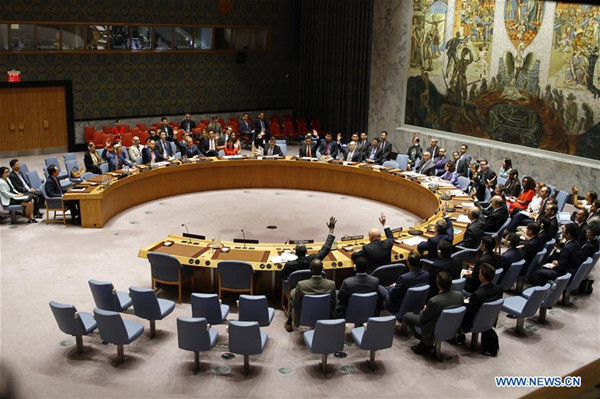 Photo taken on Aug. 5, 2017 shows the United Nations Security Council voting on a resolution on the Democratic People's Republic of Korea (DPRK) at the UN headquarters in New York. UN Security Council adopted resolution on Saturday in response to DPRK's two intercontinental ballistic missile (ICBM) tests in July. (Xinhua/Li Muzi) The United Nations Security Council on Saturday unanimously adopted a U.S.-drafted resolution that aims to slash by a third the Democratic People's Republic of Korea's 3 billion U.S. dollars annual export revenue over Pyongyang's two intercontinental ballistic missile (ICBM) tests in July. The resolution would ban DRPK's exports of coal, iron, iron ore, lead, lead ore and seafood. It would also prohibit countries from increasing the current numbers of DPRK's laborers working abroad, ban new joint ventures with DPRK and any new investment in current joint ventures. Resolution 2371 (2017), adopted unanimously by the Security Council on Saturday, strengthens UN sanctions on the DPRK in response to its two intercontinental ballistic missile (ICBM) tests conducted on July 3 and July 28, respectively. As such, this resolution "sends a clear message" to the DPRK that the Security Council is united in condemning its violations and demanding the country give up its prohibited nuclear and ballistic missile programs. Resolution 2371 (2017) includes the strongest sanctions ever imposed in response to a ballistic missile test. These measures target DPRK's principal exports, imposing a total ban on all exports of coal (DPRK's largest source of external revenue), iron, iron ore, lead, lead ore and seafood. Banning these exports will prevent the DPRK from earning over one billion U.S. dollars per year of hard currency that would be redirected to its illicit programs, according to the resolution. The DPRK earns approximately 3 billion U.S. dollars per year from its exports. Additional sanctions target the DPRK's arms smuggling, joint ventures with foreign companies, banks, and other sources of revenue. A resolution needs nine votes in favor, and no vetoes by the United States, China, Russia, France or Britain, to be adopted. The measures would be the seventh set of UN sanctions imposed on DPRK since it first carried out a nuclear test in 2006. |